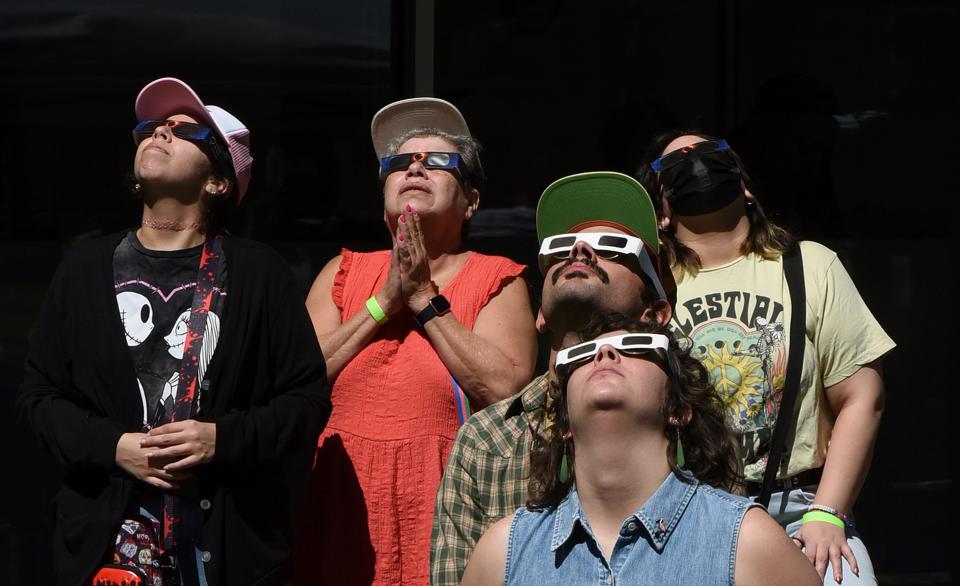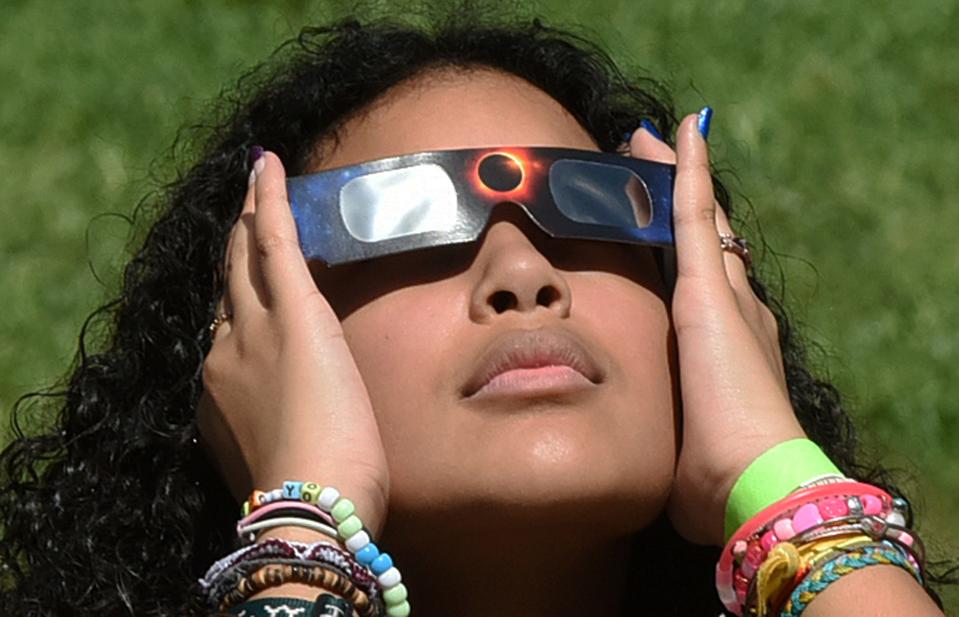Where to buy total solar eclipse glasses to protect your eyes during April 8 eclipse
Special safety glasses to protect against permanent eye damage from watching the total solar eclipse will be selling out fast as April 8 approaches, and experts suggest people buy now if they plan to see the event.
Without eclipse viewers, which allow just 0.0001% of the light that falls on them through, looking at the sun during an eclipse can cause burns to the retina called "solar retinopathy."
It’s not that the sun is more intense during an eclipse, but because it is partially or totally blocked by the moon, it can be easier to look at without squinting or turning away. The April 8 path of totality, where the moon completely covers the sun, will travel from Texas through Maine. Palm Beach County will experience about 50% of the sun covered during next month's eclipse.
“You look at it, and maybe it’s not bothering you, but at the same time, it’s frying your retina,” said Antonio Bolet, clinical manager at Mittleman Eye, which has offices in West Palm Beach and Jupiter. “Literally, just a few seconds will cause permanent damage.”
Where to buy solar eclipse glasses
The American Astronomical Society has a list of reputable sellers of solar eclipse glasses on its website eclipse.aas.org, and cautions against buying from large online-only marketplaces where the seller and manufacturer may not be easy to verify.
Glasses marked with “ISO 12312-2” ensure the glasses, and other eclipse viewers, comply with international safety standards for having appropriate filters to directly view the sun. ISO stands for the International Organization for Standardization.
“The problem is anyone can print on an eclipse viewer that they conform with ISO standards,” said Susanna Kohler, press officer for the American Astronomical Society (AAS). “Everyone loves these shopping sites because you can get items overnight, but that comes with its own risks in regard to the glasses.”
Hotels booked, cars reserved: The next total solar eclipse is in April and people already have travel plans
Some North American manufacturers recommended by the AAS for eclipse glasses are America Paper Optics, Rainbow Symphony, Halo Eclipse Spectacles and Thousand Oaks Optical.
Eclipse glasses usually cost under $3 per pair, but may have to be bought in multi-packs. At Rainbow Symphony, a 5-pack of sunglasses costs $10.95. A 25-pack at American Paper Optics (eclipseglasses.com) is running $68.75.
AAS warns against searching online marketplaces "and buying from whichever vendor offers the lowest price."
There are more than 50 authorized dealers listed on the AAS site, as well as several large retail chain stores including Walmart, Lowes and Staples.
But even the chain stores come with caveats. If you buy glasses in the store, they are likely to be legitimately ISO-compliant, but the same can’t be said if they are purchased on a store’s website because some chains use different suppliers for online sales, the AAS site notes.
During the 2017 total solar eclipse, which covered a swath of the country from Oregon to South Carolina, the AAS warned of a “flood” of fake solar eclipse glasses hitting the market in the weeks prior to the event. Amazon recalled an unknown number of questionable glasses citing safety concerns and asked third-party sellers to provide documentation to verify their products were compliant with eclipse standards.
Companies that didn’t provide the documentation had their products pulled from the site and customers who bought them were notified of the potential defect.
“We have not seen unsafe eclipse glasses on the market at this point, but that doesn’t mean that they aren’t out there,” Kohler said. “As we get closer to the eclipse, retailers will sell out, so people should plan ahead.”
The only time it's safe to take the safety glasses off during an eclipse is in the path of totality during the brief time the sun is fully covered by the moon and only the corona is visible.
The total solar eclipse 1918: What was Palm Beach County like then?
Because Palm Beach County will experience about 50% of the sun being covered by the moon, it won't be safe at any time to remove the glasses while viewing the eclipse.
In West Palm Beach, the eclipse will begin at 1:48 p.m. with maximum coverage occurring at 3:03 p.m.
Free eclipse glasses available at some public libraries and watch events
Free eclipse glasses will be available while supplies last at Palm Beach County public libraries beginning March 25. One pair will be given to each Palm Beach County Library System card holder. The cards must be presented to receive the glasses.
Planning is also being finalized for a glasses giveaway at the Mandel Public Library in West Palm Beach.
Several South Florida observatories that will be open for the eclipse will have a limited number of glasses. Those include the Marmot Observatory at the Cox Science Center and Aquarium in West Palm Beach, Florida Atlantic University’s observatory in Boca Raton and the Fox Astronomical Observatory in Sunrise.

Bolet said he’s reluctant to look directly at an eclipse even with the glasses. Instead, he recommends using a pinhole viewer where the eclipse image is projected onto the ground through a hole cut into a piece of paper.
But Kohler said it is safe to view an eclipse with appropriate protection.
“We don’t want people to be so afraid that they don’t get to experience the eclipse,” she said. “The message we are trying to get out is to be prepared and get the right safety glasses.”
Do you really need glasses for a solar eclipse? Yes, here are safety tips for using.

∎ Ordinary sunglasses, even very dark ones, are not safe for looking at the sun.∎ To safely view a partial eclipse, wear official eclipse viewing glasses that meet International Organization for Standardization (ISO) 12312-2 safety standards.∎ If you wear regular eyeglasses, place the solar eclipse glasses on top of them.∎Supervise children using the special glasses to make sure they use them correctly. Adjust your child’s glasses to fit his or her face properly. If the glasses are too big, cut and tape them at the nose to make them smaller.∎ Do not look at the eclipse through a camera, binoculars or telescope. This is important even if you are wearing eclipse glasses. The intense solar rays coming through these devices will damage the solar filter and your eyes.∎ Use solar eclipse filters on camera lenses, binoculars and telescopes. Check the filter before the eclipse and if it is damaged or scratched, replace the filter.∎Use extra precaution, such as an indirect viewing method, if you are taking a medication that dilates your pupils — this reduces the time it takes to injure your eyes.
Where is the best place to see the solar eclipse 2024?
The total total eclipse or "path of totality" of what's become known as the Great North American Eclipse will start in the South Pacific Ocean, pass from Mexico into Oklahoma, and travel diagonally across the country through New Hampshire until it leaves continental North America over Newfoundland.
In Florida, Pensacola will see about 76% of the sun covered by the moon. The coverage decreases the farther south you go so that West Palm Beach will see about half of the sun covered beginning at 1:48 p.m. Maximum coverage will occur at 3:03 p.m.
Several South Florida observatories will be open for the eclipse, including the Marmot Observatory at the Cox Science Center and Aquarium in West Palm Beach, Florida Atlantic University’s observatory in Boca Raton and the Fox Astronomical Observatory in Sunrise.
Kimberly Miller is a veteran journalist for The Palm Beach Post, part of the USA Today Network of Florida. She covers real estate and how growth affects South Florida's environment. Subscribe to The Dirt for a weekly real estate roundup. If you have news tips, please send them to kmiller@pbpost.com. Help support our local journalism, subscribe today.
This article originally appeared on Palm Beach Post: Solar eclipse 2024 glasses: types; free; safety tips; where to see

